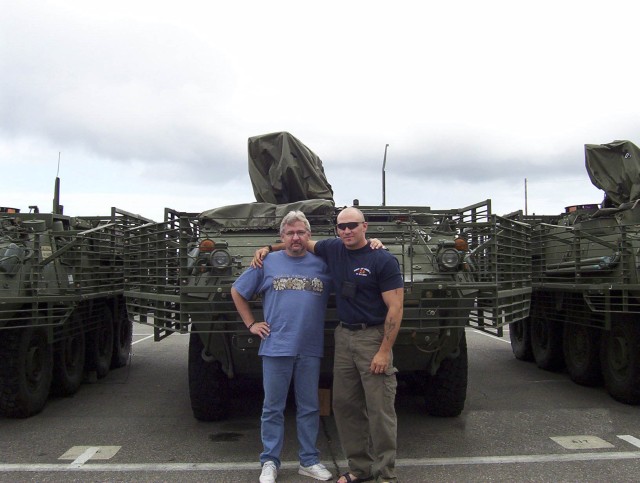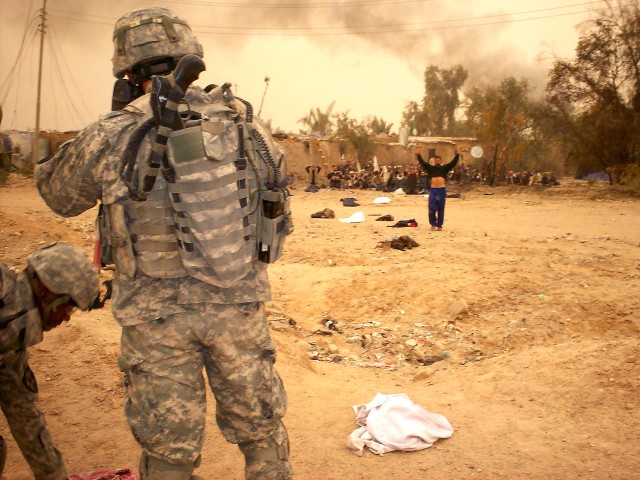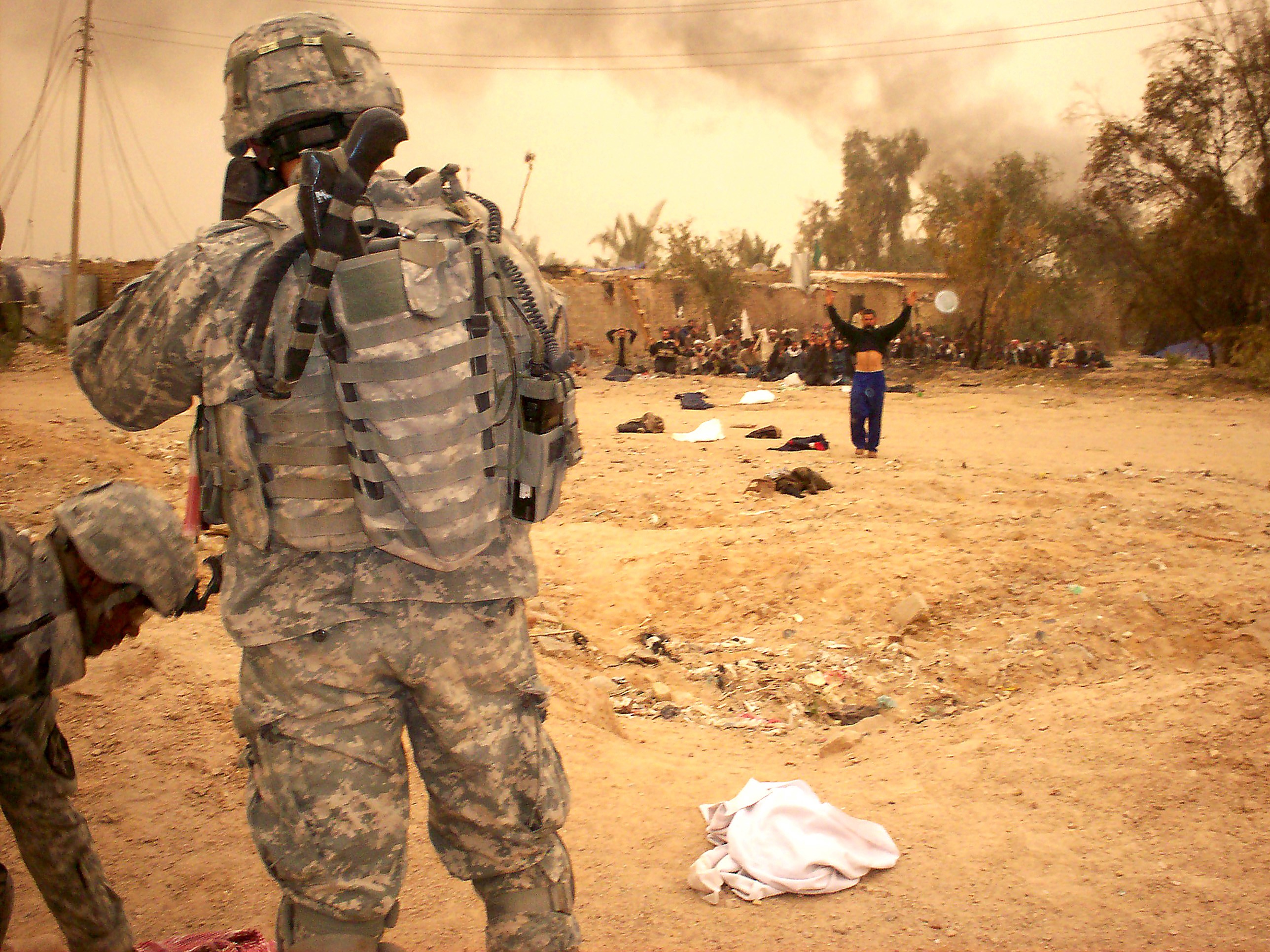FORT LEWIS, Wash. - The bond between a Fort Lewis Soldier and his father has survived death and become tangible in a unique book. The volume will soon join the growing number chronicling Iraq combat experiences, but "Last Journey: A Father and Son in Wartime" is different. The author sets the accounts of his son's concurrent military, intellectual and internal lives in the biography of a truly exceptional Soldier, adding his own narrative to his son's original e-mails and journal entries.
In a literal labor of love, Darrell Griffin Sr., the father of a former 3rd Brigade, 2nd Infantry Division staff sergeant, finished the book he started in collaboration with the son he lost in Iraq. For his research and seeking closure for his grief, he made an improbable trip to Iraq to the Sadr City street where his son died.
Atlas & Company Publishers will release "Last Journey" Monday, co-authored by Griffin Sr. and his son, Skip, who was killed by a sniper's bullet March 21, 2007. He was riding air guard in the rear hatch of his Stryker vehicle when he was struck from behind, between his Kevlar helmet and the top of his flack vest - a tragically perfect shot.
Two hours earlier, his platoon leader had asked Griffin why he was in such a good mood.
"I don't really know, but I think God has something special planned for me today," he told 1st Lt. Gregory Weber.
The younger Griffin was a squad leader in 2nd Battalion, 3rd Infantry Regiment, the Patriot Battalion, when he died. He was a 6-foot-2-inch, larger-than-life infantry leader whose passing not only left his family in grief and shock, but his fellow C Company Soldiers, also.
He had won a Bronze Star Medal with V-device for two acts of heroism during his first Iraq tour with 1st Brigade, 25th Infantry Division, and his reputation had accompanied him to 3rd Brigade.
"No other Soldier in the unit wanted to be out in the fight more than he did," said his company commander, Capt. Stephen Phillips, March 29, 2007, at his Fort Lewis memorial. Phillips helped carry Griffin's litter to the medevac helicopter in a futile attempt to save his life. "He was born to lead infantrymen into combat, and it's what he did best. His impact on the men he cared for so dearly will carry throughout careers and lifetimes."
If Griff was vulnerable, some said at his memorial, they felt they all were. His loss was hard for everyone to process, most of all, his father. He was 18 when his oldest son arrived. From the start, they shared an uncommon bond.
"Skip and I grew up together," said Griffin Sr. in a telephone interview with the Northwest Guardian from his home in Sherman Oaks, Calif. "When he was born, we lived in a little 8 x 20-foot trailer, a little cracker box. That'll drive everybody a little mad or bring people closer together."
The book details the 2-3 Inf. Soldier's "Dust Bowl Lineage," his troubled youth and a restless intellect that often left him bored in school. Sent to detention in junior high, he told his teacher he hadn't brought any books with him to study.
"He went to the bookshelf and got a book of Plato and another by George Orwell," Griffin Sr. said. "I was driving my son home from detention that day, and he was quizzing me on the cave allegory of Plato."
Father and son read the great works of philosophy and religion and relished long discussions about them that became "merlot evenings" when Skip turned drinking age. They called their discussions "the Great Conversation," and decided they would one day write a book based on their dialogues about life, religion and philosophy.
When he enlisted in the Army, Griffin Jr. was proud, but conflicted. His combat experiences in Tal 'Afar during his first tour in Iraq with Apache Company, 1st Battalion, 5th Infantry Regiment in the 25th Inf. Div., both validated his warrior calling and increased his frustration at the plight of innocent Iraqi citizens trapped in a war zone.
He returned to Fort Lewis and was scheduled to PCS to Germany with his unit, but surprised his wife and family by transferring to 2-3 Inf. The Arrowhead Brigade to which it belonged was scheduled to deploy to Iraq in June 2006.
The operations tempo in Tal 'Afar had rarely left him time to e-mail, but he kept in better touch when he was assigned to the Patriot Battalion tactical operations center.
After six months, Griffin was reassigned from battalion staff to "Charger" Company prior to a battle in southern Iraq south of Najaf, in the small village of Zarqa. Members of a Shiite religious cult shot down an Apache helicopter, and 2-3 Inf., two U.S. Special Forces teams and elements of the Iraqi Army rushed to the rescue. The Shiite zealots fought an all-night battle from sophisticated defenses on their compound, callously exposing their families to danger in the process.
"That battle bothered Skip," his father said. "He knew it had to happen, but it bothered him that the warriors on the other side wouldn't send their women and children out. They were given several opportunities to surrender, and they wouldn't do it."
For hours the morning after the battle, Griffin processed the wounded as well as the women and children until every detainee was situated with food, water and first aid. The Patriots were reassigned soon afterward to Baghdad.
Griffin Jr. sent his pain and misgivings about the battle to his father in his e-mails.
"I suggested he use (writing) as therapy," Griffin Sr. said. "He did, and started taking lots of pictures ... He wrote about 22 pages before he was killed. It was a slow write, but we were collecting e-mails knowing that that would be part of the book."
The elder Griffin had already started buying wine for their discussions upon his son's return from his second combat tour. He had planned a monthlong visit to Fort Lewis to work on their book when the news came of his son's death.
Through his grief, Griffin knew he had to finish the book he and his son had planned to write.
"I thought that Skip had something to say to the world and this is how he would want to do it," Griffin said. "I didn't feel like he could rest in peace until I had gotten done what we had both wanted to do. It was one of the last things we were going to do as father and son. I wanted to complete it."
To finish the project, Griffin felt he had to somehow get to Iraq to see where his son had died and talk to his squad mates. His son's own death was the one part of the story that the e-mails and journals couldn't describe. With the help of a congressman from his California district and Multi-National Forces-Iraq Commanding General David Petraeus, he obtained State Department credentials and traveled to Baghdad for his painful research.
He returned and began the work that took him more than 18 months of 10-hour days, seven days a week in honor of his son.
"It wasn't therapeutic," Griffin said. "There were times I felt I was going to lose my mind. Most parents don't dig into the ugliness and details of how their son was killed."
As he wrote, however, he slowly came to a resolution, focusing on one of his son's favorite mottos: "Post tenebras lux," after darkness, light.
"He didn't just write 22 pages," Griffin said. "That was his start. A lot of those e-mails are what Skip would have written; that was Skip's voice. Once I got my mind in the right place, as strange as it sounds, I felt like Skip was right there with me writing it."
Don Kramer is a reporter with Fort Lewis' Northwest Guardian.




Social Sharing